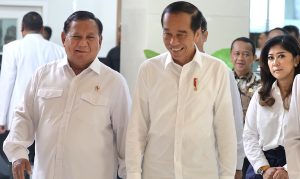The Diplomat author Mercy Kuo regularly engages subject-matter experts, policy practitioners, and strategic thinkers across the globe for their diverse insights into U.S. Asia policy. This conversation with Dr. Bridget Welsh – honorary research associate at the Asia Research Institute of University of Nottingham Malaysia, senior research associate of the Hu Feng Center for East Asia Democratic Studies of the National Taiwan University, and senior associate fellow of The Habibie Center – is the 407th in “The Trans-Pacific View Insight Series.”
Explain the rationale behind Indonesian President Joko “Jokowi” Widodo’s decision to support his political rival-turned-defense minister, retired general Prabowo Subianto, in Indonesia’s presidential election.
Even as he prepared to end his presidency, Jokowi is not leaving politics. Instead, he is building his own political empire. When relations soured with PDIP [Indonesian Democratic Party of Struggle] leader Megawati Sukarnoputri in July last year, he needed a different path to maintain his political influence and secure his legacy. He opted to ally with Prabowo, as their interests aligned. Both men were stronger together, weakening other rivals.
Now that Prabowo has secured the presidency, the issue is whether the relations between both men will remain cordial and aligned. Also important is what political position Jokowi takes after his presidency is over in October.
Explain how Prabowo will strategically position Indonesia amid rising China-U.S. tensions.
The choice of foreign minister in the Prabowo presidency is not yet confirmed. Early indications are that Prabowo will not opt for a senior diplomat from the Foreign Ministry (known as Kemlu) for this position, as has been the norm in Indonesian politics. Indications suggest that Prabowo himself will be prominent in setting foreign policy priorities and representing Indonesia externally, unlike Jokowi.
Indonesia has seen closer ties with China on infrastructure and investment, while maintaining close ties with the United States on military and security cooperation. These trends are likely to continue, working to the strengths of relationships with both great powers. Prabowo’s focus on modernizing Indonesia’s military will be an arena to watch to see how he navigates the contentious security issues.
Indonesia has a long history of avoiding choosing sides, opting for non-alignment, and focusing on building its own international position. Unlike smaller countries in Southeast Asia, Indonesia’s stature allows it to set its own path, to avoid being caught in the China-U.S. competition. As a nationalist and former general, Prabowo will be actively working to increase this stature and move Indonesia out of the shadow of a focus on great powers.
Analyze the political dynamic between Prabowo and Mohammad Mahfud, minister for political, legal and security affairs.
Prabowo is building a broad legislative coalition among parties in parliament. These negotiations are ongoing. All indications at this juncture are that PDIP, the party that Mahfud was on the ticket for as vice president with presidential candidate Ganjar Pranowo, is to form the opposition.
PDIP was badly bruised by its performance in the election, only securing 16.5 percent of the vote. Ganjar and Mahfud have opted to contest the election results in Indonesia’s Constitutional Courts due to reported irregularities.
More generally, Prabowo and Mahfud represent different ideological spectrums in Indonesia. Prabowo is a conservative, ethno-nationalist, while Mahfud, known for his defense of human rights, is more liberal and multicultural. Concerns are that Prabowo will narrow Indonesia’s democracy and curb rights.
Identify the top three strategic priorities for Jakarta as China’s regional role and influence expands.
Given a president’s role setting the direction for Indonesia, the three strategic priorities of Prabowo are modernizing the military, continued growth from investment and infrastructure improvements, and expanding Indonesia’s international role. As such, there is likely to be increased military spending, outreach for investment, especially through the rise of businessmen in Prabowo’s close circle, and a deepening of Indonesia’s engagement in multilateral international institutions.
Indonesia does not subscribe to the view that China’s expanding influence is negative, as is the view from Washington, D.C. There is more openness to opportunities for engagement with China, especially in the economy. Unlike other countries in Southeast Asia (who are more reticent in criticizing China), Indonesia has been open about infringements in Indonesia’s waters. Indonesia’s priorities are on strengthening itself, as there is not an obsessive focus on China in setting Jakarta’s priorities.
What is your outlook for how Prabowo’s cabinet will manage Indonesia-U.S. relations?
Prabowo comes into office at a time when public views of the United States in Indonesia have been hard hit by President Biden’s support for Israel and the genocide in Gaza. The Biden administration has underappreciated how much damage its position on Israel has caused globally, and while it is working back channels in the Middle East, the view that the U.S. is responsible for the suffering in Gaza is widely held. Boycotts of U.S. companies are widely supported in Indonesia, for example. As such, there is limited public support for strengthening the U.S. relationship. That the Biden administration was slow in congratulating Prabowo has not helped the relationship at the elite level.
Prabowo’s cabinet is not yet finalized. Personalities will be crucial in shaping relations at the elite level and bilaterally. It is likely that the transactional mode of foreign policy that Jokowi practiced will deepen in the new administration.

































